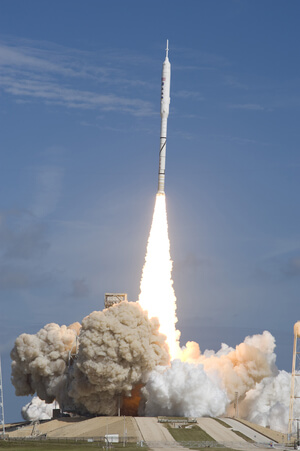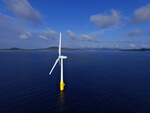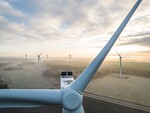News Release from windfair.net
Wind Industry Profile of
Space Technology for Offshore Wind Energy
Ares was the name of a series of launchers planned by NASA, which were developed between 2006 and 2010. But the program was stopped in 2010 for financial reasons (see picture below, copyright: NASA). The scientific knowledge gained from the research could now be applied to offshore wind technology.
Every rocket vibrates when it is launched into space. However, if the vibrations are too strong, they potentially endanger cargo and the astronauts on board. The proven solution against unwanted resonance vibrations would be to increase mass, but this is difficult in a rocket because every gram counts. That's why the engineers had to come up with something new.
 As NASA describes on their blog, they found a way to use the liquid fuel only used for the second stage of the rocket start, to get the vibrations under control: They did this by loading a small device into the liquid that expands and contracts at a certain frequency. This caused the liquid to vibrate in time with the device, but no longer together with the vibrations of the spaceship. Essentially, the fuel then behaved as if it was no longer part of the spacecraft, which changed the overall resonance response of the rocket.
As NASA describes on their blog, they found a way to use the liquid fuel only used for the second stage of the rocket start, to get the vibrations under control: They did this by loading a small device into the liquid that expands and contracts at a certain frequency. This caused the liquid to vibrate in time with the device, but no longer together with the vibrations of the spaceship. Essentially, the fuel then behaved as if it was no longer part of the spacecraft, which changed the overall resonance response of the rocket.
After the project was discontinued, the engineers tried to use the device in other useful ways. They considered using it in buildings to stabilize them in case of earthquakes or to protect very tall skyscrapers in strong winds.
The offshore industry also came into focus, because “one of the logical places where there is a lot of fluid is in maritime environments,” as Rob Berry of NASA says. In particular, the technology of floating turbines, which are more directly exposed to wind and waves than fixed turbines, were interesting. “Our goal was to show the industry that this technology applies to their use cases, that it does work, and that it is implementable. They loved the idea, for a building, but nobody wanted to take that leap, so we had to go show it,” says Berry.
So in 2018, they teamed up with the University of Maine, which has a wave tide pool to simulate maritime conditions and a small-scale wind turbine to test the device called 'Fluid Structure Coupling Technology'.
The test was a complete success: about 90 percent of the up and down movement could be eliminated with the device. In other words, when the unit was switched off, the wind turbine bounced up and down in the waves, but was essentially level with the unit when it was switched on, even if the waves continued to bounce off the turbine. This makes the turbines much more efficient in generating energy. “When the platform pitches about dynamically, it affects the ability of the blades to capture sufficient wind in a consistent way,” explains Ikpoto Udoh, a senior engineer at Houston Offshore Engineering which is currently testing the device on their own offshore platforms.
In the meantime, the project has been able to collect various funds from the U.S. government for further research and test runs.
- Author:
- Katrin Radtke
- Email:
- press@windfair.net
- Keywords:
- space, rocket, offshore, floating, floater, liquid, device, swing, waves, wind, industry, NASA, experience, University of Maine, test, run


























